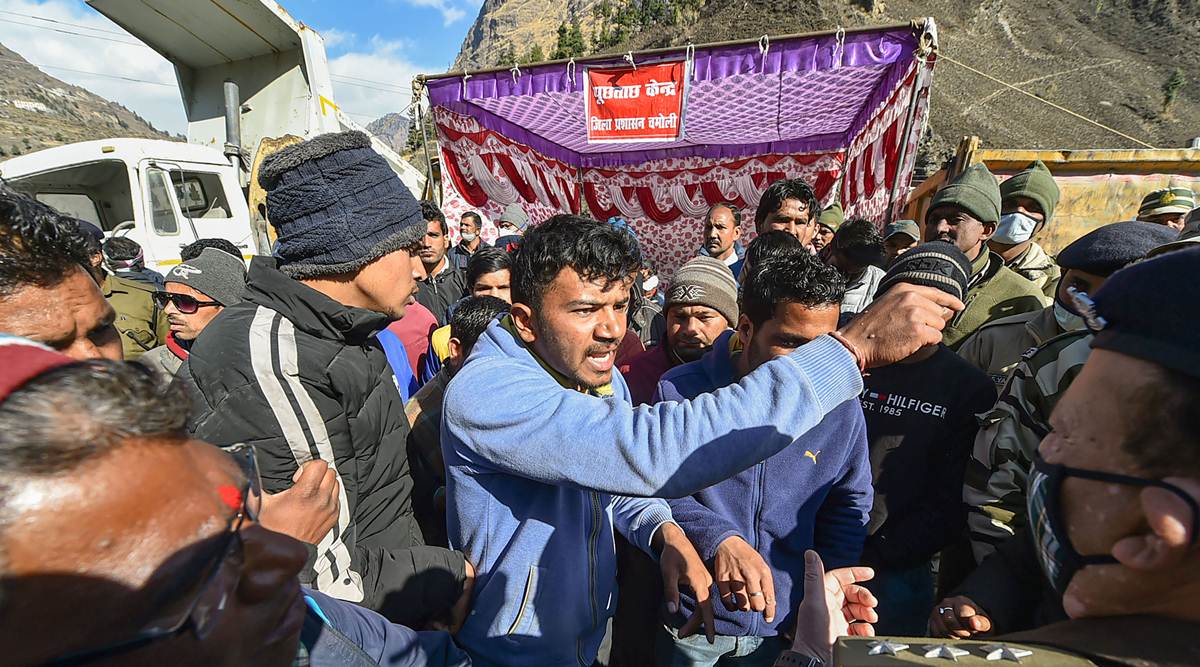 A spat between relatives of those missing and officials at a an inquiry centre near Tapovan tunnel on Wednesday. (PTI )
A spat between relatives of those missing and officials at a an inquiry centre near Tapovan tunnel on Wednesday. (PTI ) TRUCKLOADS OF boulders and mud were brought to Raini Village on Wednesday morning to start work to build a bridge over the Rishi Ganga river. Families of those who were working at the Rishiganga Power Plant when a gush of water, ice and mud covered the entire area, stood by helplessly as hope that the bodies of their kin would be recovered slowly faded.
With a crucial suspension bridge, which is the only link between 13 villages and the rest of the Chamoli district, being washed away in the flash floods, the Border Road Oganisation (BRO) has all but given up on recovering the bodies and is focusing on building a connection, which officers say can be ready in two or three weeks if everything goes well.
Four bodies and the remains of a fifth were recovered till Tuesday evening. On Wednesday, the count remained the same even as several tons of debris had been moved.
“We have looked at two points from where we can start rebuilding the bridge and have started work on both. Depending on which is found to be more apt, we will proceed. It is our priority to reconnect the two parts as people in the other villages are suffering,” said Major Parashuraman from BRO, who is a commandant at the Raini village site.
Another BRO team was also present at the site that has been cut off as work on the road was already underway.
The family of Basharat Zargar, general manager at Kundan Group which owns the project, has been running around since Monday hoping to find his body. On Wednesday, as work on the road construction progressed, his brother Shabir lost patience.
“The organisation has made it very clear that they will not look for the bodies anymore. Why else would they pour mud and cover the area with stones instead of digging. This is a tragedy and we understand road connectivity is important but doesn’t everyone deserve dignity in death? We are just asking them to recover their bodies,” he said, tears streaming down his face.
A senior BRO official, meanwhile, said that the sludge was so thick and deep, that it would take several days to recover the bodies.
We are proud to announce that Jharkhand CM @HemantSorenJMM will be the Chief Guest of the discussion ‘Decoding India’s internal migration’ on February 12 at 2pm.
Register here to join: https://t.co/ngDRKfgS9T pic.twitter.com/7DLIk0HZju
“The National Disaster Response Force officials are still looking but we have to ensure that the road is built. This is not just important for the villagers — they are dependent of helicopters for basic supplies – but also strategically. The China border is around 130 km from here and the need for connectivity is urgent,” the official said.
With sludge blocking the road being moved towards the river on Wednesday, NDRF teams got a chance to move towards the area where a three-storey guest house and residential area is believed to have been submerged. An underground pump house, 30 metres deep according to an IIT Roorkee report on the project, was built next to the guest house and residential complex.
Officials tried to find a way to look for bodies in the deep sludge, but returned in an hour. “The sludge is deep and can suck rescuers in. We do not have the machinery to clear this at present. BRO is working on rebuilding the road and bridge and clearing the path. We assure people that we will not give up, but we have to find a way to look for the bodies. At present, we do not have answers,” said the NDRF supervisor.
Four excavators worked to clear the mud, ice, iron bars, crumpled tin sheets, tires and paper records from the power plant office, even as family members tries to sift through the remains.
The sight of boulders and mud being brought in had Imran Khan seething. He, along with seven others, travelled from Saharanpur to Joshimath as their relatives were working at the power plant.
“We know they are dead, we are not ignorant. No one can survive a calamity like this, but do their families not deserve to see them one last time? All we want is that they look for bodies while building the bridge. All excavators have been pushed in to lay the road, not a single one is looking for the remains of our brothers,” said Khan. Five people from his village in Saharanpur, including his brother, were working at the plant when the flash floods ravaged the area.